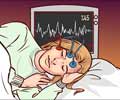Sleeping too little, or too much, can lead to weight gain in adults, according to a new study. Researchers at Laval University in Quebec, Canada, have suggested that the optimal
A new study has indicated that adults who sleep too little or too much leave themselves open to unnecessary weight gain.
Researchers at Laval University in Quebec, Canada, have suggested that the optimal amount of sleep is between seven to eight hours a night.The study, authored by Jean-Philippe Chaput, focused on 276 adults between 21-64 years of age, whose body composition measurements and self-reported sleep duration were determined.
Changes in fatty indices were compared between short (five to six hours), average (seven to eight hours) and long (nine to 10 hours) duration sleeper groups.
Changes in the amount of their body fat were tracked over six years.
People who were in the short-duration sleep group gained on average 4.4 pounds more. Long-duration sleepers gained 3.5 pounds more than average sleepers.
People in the short-sleeper group were 35 per cent more likely to report a weight gain of 11 pounds over that period than average sleepers, and long sleepers were 25 per cent more likely to do so.
Advertisement
"Our study provides evidence that both short and long sleeping times predict an increased risk of future body weight and fat gain in adults. Furthermore, these results emphasize the need to add sleep duration to the list of environmental factors that are prevalent in our society and that contribute to weight gain and obesity," said Chaput.
Advertisement
The study is published in the April issue of Sleep, the Journal of the American Academy of Sleep Medicine.
Source-ANI
RAS/L











